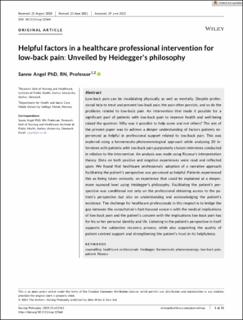| dc.contributor.author | Angel, Sanne | |
| dc.date.accessioned | 2024-03-11T10:18:47Z | |
| dc.date.available | 2024-03-11T10:18:47Z | |
| dc.date.created | 2021-09-14T12:56:26Z | |
| dc.date.issued | 2022 | |
| dc.identifier.citation | Nursing Philosophy. 2022, 23 (1), e12364. | en_US |
| dc.identifier.issn | 1466-7681 | |
| dc.identifier.uri | https://hdl.handle.net/11250/3121763 | |
| dc.description.abstract | Low-back pain can be invalidating physically as well as mentally. Despite professional help to treat and prevent low-back pain, the pain often persists, and so do the problems related to low-back pain. An intervention that made it possible for a significant part of patients with low-back pain to improve health and well-being raised the question: Why was it possible to help some and not others? The aim of the present paper was to achieve a deeper understanding of factors patients experienced as helpful in professional support related to low-back pain. This was explored using a hermeneutic-phenomenological approach while analysing 20 interviews with patients with low-back pain purposively chosen interviews conducted in relation to the intervention. An analysis was made using Ricoeur's interpretation theory. Data on both positive and negative experiences were read and reflected upon. We found that healthcare professionals’ adoption of a narrative approach facilitating the patient's perspective was perceived as helpful. Patients experienced this as being taken seriously; an experience that could be explained at a deeper, more nuanced level using Heidegger's philosophy. Facilitating the patient's perspective was conditional not only on the professional obtaining access to the patient's perspective but also on understanding and acknowledging the patient's existence. The challenge for healthcare professionals in this respect is to bridge the gap between the consultation's fact-focused concern with the medical implications of low-back pain and the patient's concern with the implications low-back pain has for his or her personal identity and life. Listening to the patient's perspective in itself supports the subjective recovery process, while also supporting the quality of patient-centred support and strengthening the patient's trust in its helpfulness. | en_US |
| dc.language.iso | eng | en_US |
| dc.relation.uri | https://doi.org/10.1111/nup.12364 | |
| dc.rights | Navngivelse 4.0 Internasjonal | |
| dc.rights.uri | http://creativecommons.org/licenses/by/4.0/deed.no | |
| dc.title | Helpful factors in a healthcare professional intervention for low-back pain : unveiled by Heidegger's philosophy | en_US |
| dc.type | Peer reviewed | en_US |
| dc.type | Journal article | en_US |
| dc.description.version | publishedVersion | en_US |
| dc.source.volume | 23 | en_US |
| dc.source.journal | Nursing Philosophy | en_US |
| dc.source.issue | 1 | en_US |
| dc.identifier.doi | 10.1111/nup.12364 | |
| dc.identifier.cristin | 1934140 | |
| dc.source.articlenumber | e12364 | en_US |
| cristin.ispublished | true | |
| cristin.fulltext | original | |
| cristin.qualitycode | 1 | |

